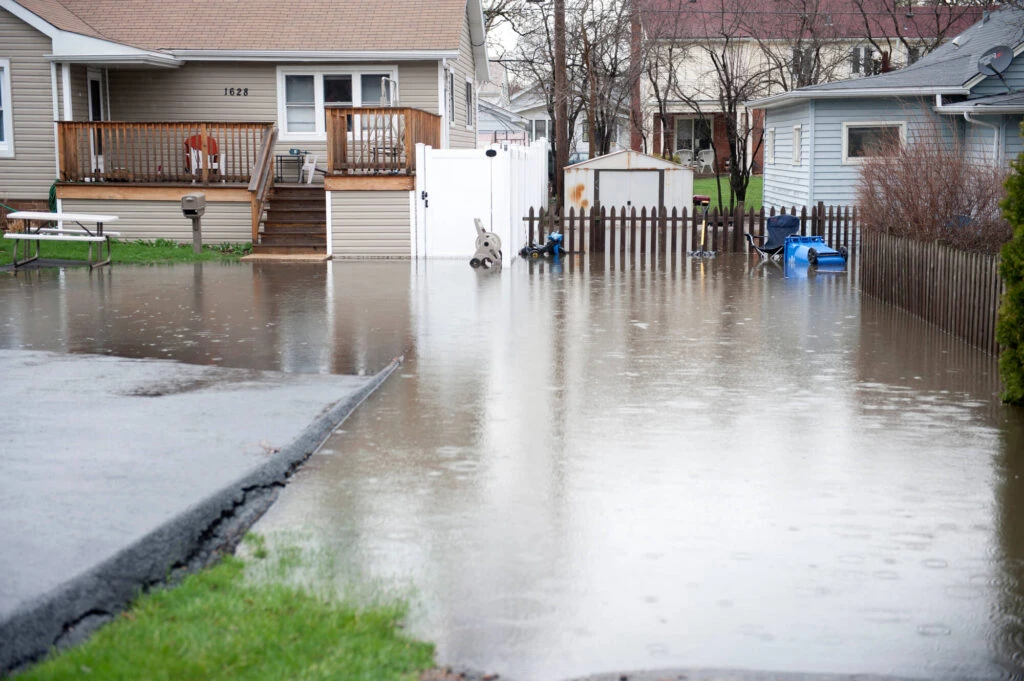Prevent Flooded Backyards
You take excellent care of your backyard, but all it takes is one massive downpour to ruin all of the hard work that you have put into your lawn care. Depending on where you are in the country, you may experience rain from time to time, and the occasional rain or thunderstorm. There is a good chance that you have dealt with in-climate weather like this before, and in that case, you may have an idea of what you need to prepare your lawn for. On the other hand, if you have bought a new property, moved to a new state or city or have never dealt with weather like this before, there are a few things that you should know about preparing your backyard for flooding. Here are some of our top landscaping tips for how to manage and prevent flooded backyards.

1) Make Sure that your Yard is Graded
One of the first things that you should take a look at on your property is how your yard is graded. This process is really as simple as going outside and taking note of how your yard slopes around your home.
Is there a hill or multiple hills that are sloping down into your backyard?
Could they present issues with flooding?
Your home is going to be most secure when your backyard is sloping away from your home. This will help to ensure that the rainwater will run off away from your home, instead of toward it. This isn’t always the case. If your backyard slopes down toward your home, you may want to talk to an expert to make sure that you have the proper mechanisms in place to protect your home from flooding and water damage.
2) Add New, Absorbative Soil
Another way that you can prevent flooding damage is to make sure that you have fresh, healthy soil around your backyard. Keeping your soil healthy is a matter of making sure that you give your soil plenty of fertilizer, and making sure that you are watering your soil and plants regularly.
3) Add Mulch Around the Yard
Mulch is yet another excellent way to help prevent flood damage to your yard and your home. Mulching around your house and around gardens or any lined areas that you have plants or soil is a great way to help absorb as much rainwater as possible. To get the most out of your mulch, we recommend having a thicker layer of mulch (3-4 inches) in the soil around your home. The mulch will help maintain the integrity and placement of your soil, the mulch will absorb water on its own and help the soil absorb water as well. When mulching around your home, make sure that you keep your mulch a safe distance from your house, to make sure that the wet mulch and soil doesn’t damage your lining.
4) Take Care of Your Grass
Healthy grass needs water to stay healthy and is necessary for continued growth. This is why having healthy grass is so valuable in flood prevention, making sure that you water, fertilize, and mow your grass is a great way for helping your grass stay healthy and absorbent.
5) Grow New Grass
If you notice that there are dead patches of grass in your backyard, we recommend taking care of that immediately. As we mentioned previously, having a healthy lawn is one of the best ways to help absorb rainwater in the event of a flood.
6) Place Native Plants and Trees Throughout your Yard
Having plants throughout your backyard is another great method for mitigating the damage that a heavy downpour and flooding can cause. Native plants are going to be best suited for the amount of moisture and annual rainfall, in your area. This is going to make them the most prepared to absorb that rainwater and runoff in the event of a storm or massive amounts of rainfall. They are excellent for redirecting runoff and absorbing excess water.
There are several reasons that you should go with native or indigenous instead of exotic plants or plant species that are not native to your area, namely that too much water may kill the plant. This would make the plant significantly less effective in assisting with your flooded backyard.
7) Use Rain Barrels
Another great way that you can redirect water during a downpour is by utilizing rain barrels. Rain barrels can be placed at the end of your downspouts to capture runoff water from your roof. They are incredibly helpful in funnelling water away from your home and preventing damage to your yard and your house.
Interested in some other ways that you can prevent and manage flooding in your backyard? Contact us today with any questions.
